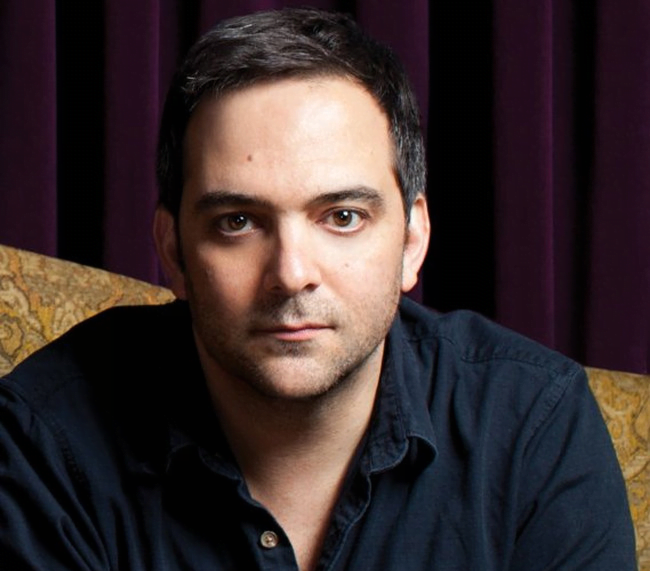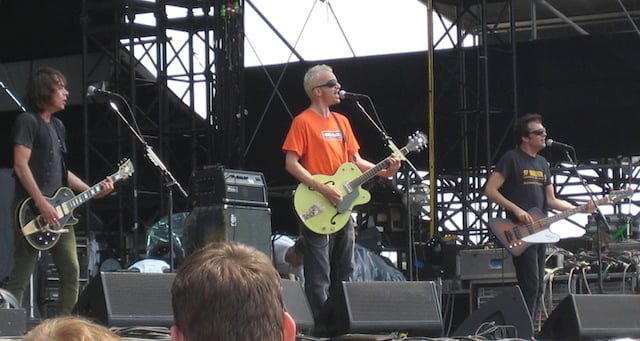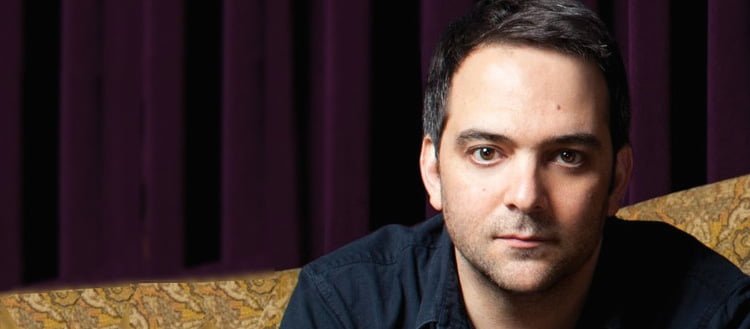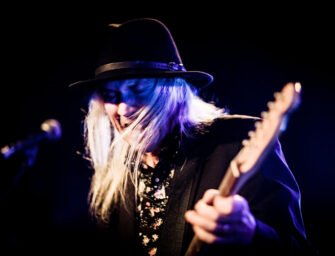
Adam Schlesinger has managed to combine soundtrack work with being in a successful band
This month, Sodajerker speak with an award-winning songwriter who excels in not just one but two areas of his craft
![]() ot many songwriters are able to successfully straddle the twin songwriting areas of writing in a band and working as a tunesmith for hire. One who can, is Oscar-nominated and Emmy and Grammy-winning musician and producer Adam Schlesinger, who’s played in Ivy, the supergroup Tinted Windows (with Taylor Hawkins and James Iha) and Fountains Of Wayne, as well as writing for TV and film.
ot many songwriters are able to successfully straddle the twin songwriting areas of writing in a band and working as a tunesmith for hire. One who can, is Oscar-nominated and Emmy and Grammy-winning musician and producer Adam Schlesinger, who’s played in Ivy, the supergroup Tinted Windows (with Taylor Hawkins and James Iha) and Fountains Of Wayne, as well as writing for TV and film.
Having been gifted a collection of Beatles records at the age of three, he soon became fixated, and for a while believed that they were, literally, the only band in existence. He started taking piano lessons at five and cut his teeth in a number of bands throughout his high school years, before meeting his Fountains Of Wayne partner – who also contributes many of the songs to the group – Chris Collingwood while studying at Williams College Massachusetts in 1986.
It wouldn’t be until after the completion of his studies, though, that the group which has made his name would come together. Prior to that happening, Schlesinger started Ivy with the Paris-born multi-instrumentalist Dominique Durand. Ivy released their debut album in 1994, around which time he reunited with Collingwood to form Fountains Of Wayne. Releasing their eponymous debut album in 1996, it wouldn’t be until their 2003 single Stacey’s Mom that the band secured their greatest success.
By that time, Schlesinger had already gained fame by receiving Oscar and Grammy nominations for writing the title track to Tom Hank’s 1996 directorial debut That Thing You Do. That, though, isn’t his only foray into the world of film – he wrote the soundtrack to Josie & The Pussycats and contributed songs to the Hugh Grant film Music & Lyrics. In addition to this, he wrote the Tony Award-nominated score for the theatrical piece Cry Baby
Here our friends at Sodajerker talk to “one of the only people whose songwriting credits include Howard Stern and Sesame Street.”
Did you grow up studying pop music, the structures and the kinds of things that songs were written about?
“Not in any formal way, just by listening to lots of music over the years and as I started to get more serious about it – to consider it as a craft – I did. But studying makes it sound like a much more organised process than it was. I started out being a big Beatles and over the years my tastes have changed. In high school I listened to The Police, The Pretenders and Elvis Costello. Then I studied jazz piano and I realised that a lot of those jazz standards and other songs are not really that different and that it’s really just stylistic choices.”
You have an incredible ability to emulate different styles. Do you think that’s the key to why you’re so good at doing the TV and Film work?
“I’m a good chameleon, but it’s dangerous. You don’t just want to do pastiches and that’s it, but I can do them and if someone tells me they want me to do something that sounds like a particular era then I can figure what the hallmarks of that style are. Part of that is about the way it’s written and part of that is about the way that it’s produced and I’m a producer also, so I’m pretty good at mimicking the sound of it as well.”
“The more specific an assignment is, the easier it is to actually do it”
So as a songwriter do you like having assignments?
“I like it a lot. I find it very creatively freeing and I find it’s much easier to write when somebody tells you exactly what they want, than when you just sit down and write with a blank page in front of you. Sometimes the more specific an assignment is, sometimes the easier it is to actually do it. Sometimes you can get into trouble, especially in the world of TV and film where nobody knows what they actually want; you’re getting a lot of direction that doesn’t make any sense… trying to read their minds.”
Would you describe yourself as a ‘confessional songwriter?’
“Not directly. I’ve come to realise over the years that I’ve put a lot of myself into the songs. I just don’t think it’s in terms of diary entries, putting in stuff that’s personal and directly linked to my life. I tend to do it in a little bit more of an oblique way.”
Is it a myth or does the good stuff come quickly?
“It sometimes takes me a while to finish something, but if I know that the idea is solid then I know that it’s worth pursuing. I think that if something isn’t working, maybe conceptually or lyrically, then it’s not worth trying to work out what’s wrong. I think that perhaps the initial inspiration comes quickly – the idea, the feel or the title, something that gets you excited – but I don’t mind taking a long time to finish something.”

Fountains Of Wayne onstage in 2007 – Adam is on the right
How do collaborations with lyricists work?
“In those cases I will be sent some lyrics and I’ll ask them if they hear any kind of rhythm and melody. So they’ll sing me a sketch of a tune and I’ll create a feel and a melody around that. I don’t really know how to articulate how I write a melody, but melodies come easier to me than lyrics do. One way I write is to start with lyrics, because I figure if I look at them enough then I’ll figure out a melody that works.”
Songs for award shows like the song you did for Neil Patrick Harris at the Tony’s – It’s Not Just For Gays Any More – are another interesting part of your catalogue as a songwriter
“Those gigs are really fun because they’re very high profile. You have to turn them around very fast, which is high pressure. I’ve worked on the Tony’s for two years with Neil and did the Emmy’s with him. You get in there for a week or ten days and just think about nothing else. He always makes it better than you could anticipate. For an example like that you just start with the concept or maybe the title and you’ll have to try and sell it to Neil [or the particular performer]. Then if they like the idea it’s doing a crossword puzzle and building up that idea.”
How did you write the song That Thing You Do and get it into the film?
“At that point I hadn’t worked in film, I’d worked in television but most was trying to get my band going – the first Fountains Of Wayne album hadn’t come out. I had a music publishing deal and there were some people there that got in touch with me and said, ‘You should take a shot at this.’ It wasn’t like I was hired; they were just putting the word out there that they needed a song that sounded like it could have been written in 1964 and performed by an American band that was imitating the Beatles. So I said I’d love to take a shot at it and spent a weekend on it. I wrote three versions, all of which were similar, played to a few friends and everyone pointed to the one [that became the final version] and said ‘that’s the one!’
“So I went into the studio and produced a demo, which sounded very authentically like an old record. After it was mixed, it was printed onto a cassette and the speed on the cassette was adjusted so that it would wobble a bit, like an old 45. It was a very convincing demo and I never expected to hear anything about it again, but it was just fun to have done it. Then I heard pretty quickly that there was interest in it and then there was a period of several months, where we were waiting to find out if it was definite or not. But it was a very lucky break for me and opened up a lot of doors.”
“We made an agreement early on that we would share credits”
When it comes to the writing process for Fountains Of Wayne, we noticed that the songs are either written by you or Chris Collingwood, but with very little overlap
“We really haven’t collaborated on a song since our first album. We made an agreement very early on that we would just share the credits, so that we wouldn’t argue about money. We write separately. We both write the music and lyrics and just bring in a finished – or mostly finished – song. One of us might make a suggestion but they’re mostly finished. Over the years we’ve got to a point where we kind of imitate each other, but in general it’s easy to tell whose song is whose. My songs are a little bit more linear in terms of the idea and narrative Chris’ are maybe more impressionistic and maybe don’t make as much sense. And I don’t mean that in an insulting way, I’m very jealous of his ability to do that, but I think that’s one thing that sets them apart.”
Stacey’s Mom is probably your biggest hit. You’d been in the band for a long time at that point…
“That was our third album and we’d been around for about eight years at that point. I don’t remember where the initial idea popped into my head, but I did remember that one of my best friends, when I was growing up, used to say that he thought my grandmother was hot. I had to tone it down a bit! I had the hook idea and then it was just a matter of playing with it. I thought that the idea was solid and fun and then it was just an exercise in seeing if I could make every part of the song hooky. It actually took me a while to finish it.”
So what’s next?
“I’m writing a musical with Sarah Silverman, which is in pretty early stages, but I’m very excited about that. I also just wrote and produced an entire record for an actress called Emmanuelle Seigner, of Frantic fame – that record is about to come out in France. I don’t know yet if there’s an American release date planned. I wrote all the songs on the record, except for two covers, and I played all the instruments. So in a way it’s like a solo record for me, with her singing!”
 Internationally renowned songwriters are queuing up to be interviewed by Liverpool-based duo Sodajerker, who now have over 50 episodes under their belt. Established in 2012 by songwriters Simon Barber and Brian O’Connor, the Sodajerker On Songwriting podcast has welcomed guests including Neil Sedaka, Johnny Marr, Ben Folds Five, Billy Bragg, Richard M. Sherman, Neil Finn, Suzanne Vega, Jimmy Webb, Rufus Wainwright and many more. To find out more about Sodajerker and their work, or to download their podcasts – including the full 55-minute interview with Adam Schlesinger– go to www.sodajerker.com. You can also connect with them via www.facebook.com/sodajerker or www.twitter.com/sodajerker, or download the podcasts from iTunes.
Internationally renowned songwriters are queuing up to be interviewed by Liverpool-based duo Sodajerker, who now have over 50 episodes under their belt. Established in 2012 by songwriters Simon Barber and Brian O’Connor, the Sodajerker On Songwriting podcast has welcomed guests including Neil Sedaka, Johnny Marr, Ben Folds Five, Billy Bragg, Richard M. Sherman, Neil Finn, Suzanne Vega, Jimmy Webb, Rufus Wainwright and many more. To find out more about Sodajerker and their work, or to download their podcasts – including the full 55-minute interview with Adam Schlesinger– go to www.sodajerker.com. You can also connect with them via www.facebook.com/sodajerker or www.twitter.com/sodajerker, or download the podcasts from iTunes.



































Related Articles